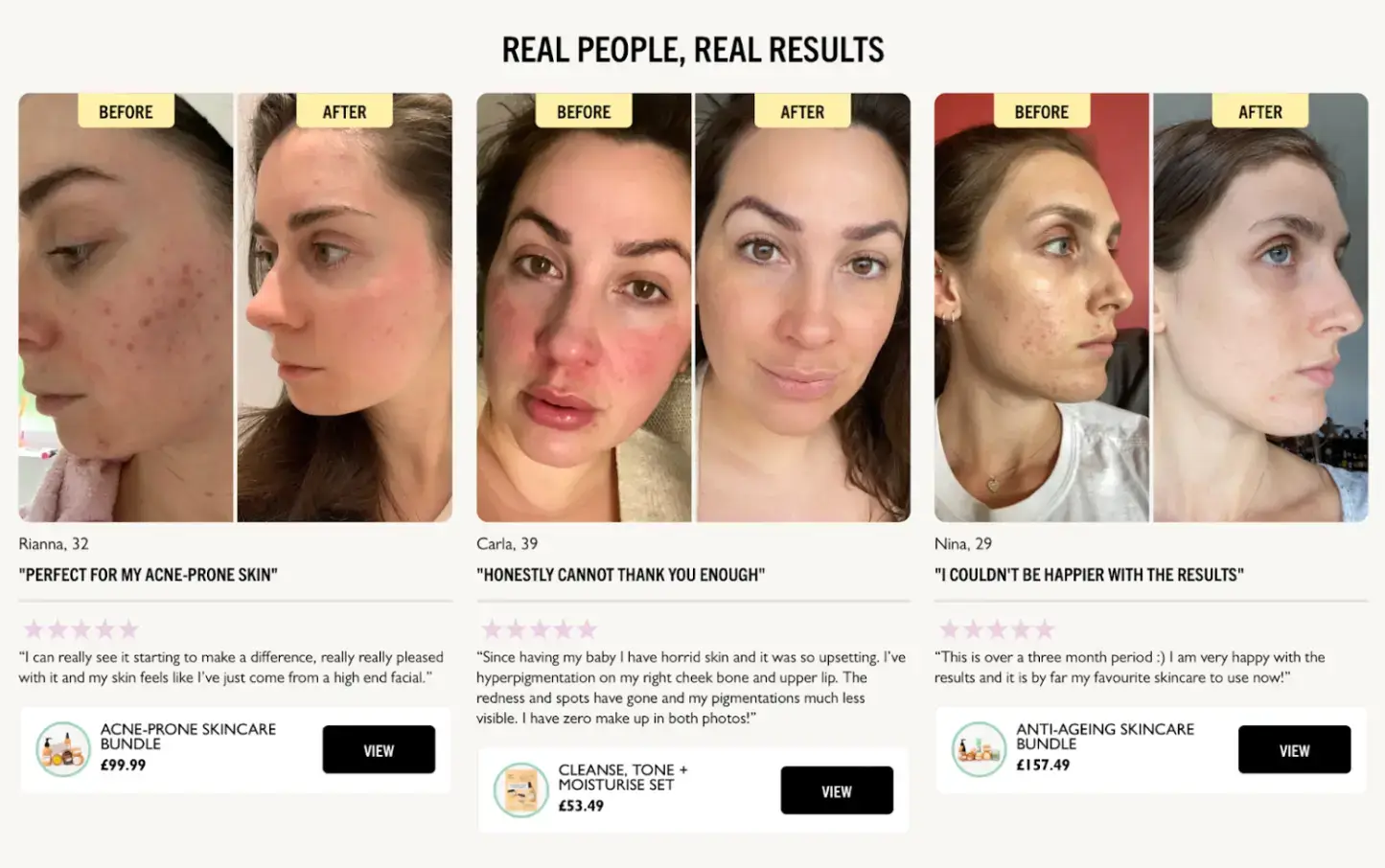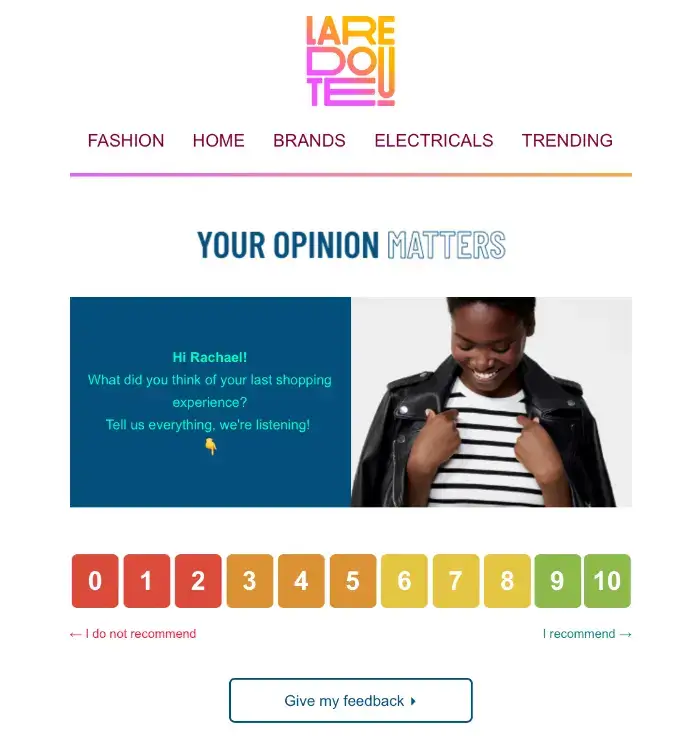The peak shopping season is an excellent time for businesses to focus on improving their online reviews. Positive reviews can increase customer trust and drive more sales, especially during high-volume periods.
But which two actions would be best for building up online reviews during this peak time? Simplifying the review process and sending timely follow-up requests are crucial strategies
Article Shortcuts:
- Do Positive Online Reviews Contribute to Brand Success?
- Eight Tips to Boost Your Brand’s Online Reviews
Online reviews are among the most influential factors in a consumer’s choice to buy in today's digital world. The reasoning behind this is clear—no advertising campaign could ever rival the genuine advice that reviews provide.
Other marketing channels, like word-of-mouth recommendations, are also important, but online reviews are nonetheless weighty.
People want to know they can trust brands, and their digital footprint—including other factors like choosing the right .io domain names—heavily influences this. Getting it right can do wonders for both the reputation and bottom line of businesses.
So, improving your online presence and encouraging positive feedback are two of the most important things you can do as this peak season approaches. Managing your online presence's reputation is essential to ensure that customers perceive your brand positively and trust your products or services.
Here, we’ll show you how to take advantage of this powerful sales and marketing tool during the busiest time of the year.

Do Positive Online Reviews Contribute to Brand Success?
Yes, positive online reviews are crucial to brand success in today's digital landscape, especially when integrated with your digital marketing strategy.
They serve as powerful social proof, influencing consumer decisions and building trust. As more people rely on the internet for product research, incorporating positive reviews into your integrated digital marketing efforts can significantly boost your brand’s credibility and drive sales.
Here’s how:
-
They encourage repeat business

Free-to-use image sourced from Pexels
-
- Good reviews not only bring in new customers but help you keep existing ones, too. Happy customers are more likely to buy from you again, which is good for your brand in the long run.
- Building a loyal customer base through positive reviews also ensures that people will continue to support and talk about your brand.
-
They build trust and credibility
- Positive reviews show people considering buying from you that other shoppers have had good experiences with your brand.
- Trust is crucial when deciding what to buy. Good reviews help build it, making people more likely to choose your products or services over your less-reviewed competitors.
-
They can increase visibility and attract new customers
- Search engines often give more weight to businesses with good reviews, which helps them rank higher in search results.
- For instance, a web user searching for a data engineering certificate training course will likely pick a provider with more positive than negative reviews.
-
They can influence consumer behavior
- Consumers often believe what other shoppers have to say. As positive reviews can directly shape people's decisions and the likelihood of them trusting you, they’re more inclined to choose your brand over competitors.
- Positive reviews can also make people feel more connected to you, which can change their behavior and make them more loyal.

-
They can boost conversion rates
- Customers are more likely to buy something after reading positive reviews. When visitors see glowing feedback about your products, it encourages them to take the leap and purchase.
- Additionally, you have a better chance of converting leads into paying customers if they can see reviews from others who are happy with their decision to buy.
-
They can differentiate your brand from its competitors
- When there are a lot of similar products on the market, good reviews can help differentiate your business. They show consumers what makes your brand unique and help it build a more positive image.
- Consistently good customer experiences will make your brand stand out from the crowd, giving it an edge in the eyes of picky consumers especially.
Eight Tips to Boost Your Brand’s Online Reviews
Now, let’s explore effective ways to boost your brand’s online reviews and make them a powerful part of your integrated digital marketing strategy.
1. Optimize your business profile on review sites
Optimizing your business profile on popular review platforms is a key step in improving your online reviews and enhancing your integrated digital marketing strategy.
Consider utilizing tools like a form builder plugin to easily gather customer feedback and testimonials directly on your website.
Additionally, implementing dynamic webforms can offer versatility in capturing diverse customer insights and preferences by allowing for customizable fields, interactive elements, and real-time feedback options.
The first impression is the most important when it comes to winning consumer trust. Before potential customers even read reviews, they will assess the quality of your business profile.
Optimize your profile with high-quality images, accurate contact information, engaging content, and detailed brand information.
The better your visibility and presentation online, the greater the likelihood that people will leave reviews for your business.
Improving your Google Business Profile is an excellent initial step. This is crucial because most of your clients will use Google to find your services before they ever get around to clicking on and visiting your website.
Ensuring your profile on Google reviews reflects the best of your brand can significantly impact your online reputation and attract more positive feedback.

Free-to-use image sourced from Pexels
Much like following blog writing tips to boost your SEO rankings, optimizing your profile can be tedious.
However, the results it delivers are worth the effort, and customers are generally more inclined to provide feedback if your profile is well-populated. Claiming your company's page on review platforms such as Yelp and TripAdvisor also offers several benefits.
2. Ask customers to leave reviews
To encourage as many positive reviews as possible, you must first nudge your customers to share their experiences with your brand.
One mistake business owners make is assuming people will tell them what they think of their products and services even when they haven’t been asked to. Unfortunately, this isn’t always the case.

Not all customers will bother writing reviews about your products, and in many cases, the bulk of reviews you will get will be from dissatisfied customers with negative opinions about their experiences, hoping to prompt a resolution or action from you.
So, make it clear that people’s experiences, good and bad, matter a lot to your business. You can utilize your customer marketing strategies to engage with your customer base effectively and prompt them to leave reviews that reflect their positive experiences.
3. Reward customers for sharing reviews
You also won’t get very far if you depend on customers leaving reviews purely for the sake of helping you. Doing so involves expending time and effort, so try offering rewards to encourage feedback.
You can often get away with offering something that’s only potentially valuable, like a chance to enter a prize draw.
There is, however, the option of providing discounts on future purchases or loyalty points instead, which can be a more effective way to encourage prospects through your lead funnel and prompt future purchases from them.
For example, a 10% discount voucher applied to their next transaction will motivate most customers to write an online review for your brand.
4. Collect buyer email addresses and follow up

Free-to-use image sourced from Pexels
One of the best ways to prompt a review is to ask customers for their contact information when they next purchase.
You can then send a polite follow-up email around a week or so later, thanking them for choosing your product and politely requesting that they leave feedback on relevant platforms.
This will not only prompt them to act but can encourage greater engagement and loyalty in the long term as it suggests you care about what they think and their opinions matter to you.
5. Offer great customer service

Free-to-use image sourced from Pexels
Companies with stellar customer service tend to have higher review scores, which makes sense given that modern consumers value customer experience highly. Your buyers should feel valued, and their experience should underpin all your key decisions.
One reason it’s crucial to deliver excellent service is that customers often complain about bad experiences and are more likely to leave negative reviews than positive ones.
Offering relevant customer support channels, reducing wait and response times, and actively closing the feedback loop with customers are all ways to enhance your service and discourage them from feeling the need to blacken your name online. All it takes is investing in the right customer service software.
6. Create personalized customer experiences
Personalization goes beyond addressing customers by name; it's about tailoring interactions to their preferences and needs. When they feel a brand understands and values them as individuals, they’re more likely to reciprocate with positive reviews.
Here's how to create personalized customer experiences:
-
Customer segmentation
- Divide your customer base into segments based on demographics, behavior, and preferences.
- Tailor communications, promotions, and interactions according to each segment's unique characteristics.
-
Personalized recommendations
- Leverage technologies like Spark SQL, which provides an efficient platform for processing and analyzing customer data.
- Use this data to provide personalized product or service recommendations.
- Highlight exclusive offers or benefits based on purchase histories and browsing behaviors.
7. Run contests and giveaways to encourage participation
Contests and giveaways are powerful tools for not only boosting engagement but also generating positive reviews. By creating a sense of excitement and incentive, you can inspire customers to share their experiences and opinions.
Here's how to run effective contests and giveaways:
-
Have clear objectives and rules
- Clearly define the objectives of the contest or giveaway, whether it's promoting a new product, celebrating a milestone, or gathering reviews.
- Establish transparent rules to ensure fairness and compliance.
-
Choose engaging prizes
- Offer prizes that resonate with your target audience and align with your brand.
- Consider prizes that encourage social sharing, such as tagging friends or sharing photos.
-
Leverage social media platforms
- Promote contests or giveaways on social media platforms to reach a wider audience.
- Encourage participants to follow, share, and engage with your brand on social channels.
-
Showcase winners and results
- Announce winners publicly, showcasing their experiences and testimonials.
- Share the positive impact of the contest or giveaway on your brand and thank participants for their contributions.
8. Check reviews regularly

Free-to-use image sourced from Pexels
Your overall rating is arguably the most essential item on a review page, so it’s best to keep an eye on this figure. Any drop in your score indicates that you have a problem that needs fixing.
This is also an excellent way to track the growth and progress of your online reputation.
Many specialist marketing and social media tools now have built-in growth management capabilities if you don’t have the time or inclination to track this manually.
These services make it super easy to ask people to review your products and allow you to keep an eye on important feedback trends.
FAQ
1. What are the best ways to encourage customers to leave online reviews?
The best ways include asking satisfied customers at the right time, simplifying the review process, and using follow-up emails.
2. How can I simplify the review process for my customers?
Provide direct links for reviews or make the process easy with minimal clicks.
3. Which two actions would be best for building up online reviews?
Simplifying the review process and using follow-up emails are two effective actions to build up online reviews.
4. Is it acceptable to offer incentives for online reviews?
It depends on the platform's policies. Offering discounts or entries into a giveaway can encourage reviews if allowed.
5. Why is it important to respond to both positive and negative reviews?
Responding to reviews shows customers that their feedback is valued, and addressing negative reviews demonstrates commitment to improvement.
6. How can I leverage reviews on social media channels?
Positive reviews can be shared on social media as testimonials, encouraging others to leave their feedback as well.
Conclusion
Boosting your brand’s online reviews is a vital part of building trust, increasing visibility, and driving growth—all key components of a successful integrated digital marketing strategy.
By actively encouraging reviews and making the process easy and rewarding for your customers, you can turn positive feedback into a powerful marketing asset.
Remember, each review not only helps to build credibility but also supports your broader marketing goals by enhancing customer engagement and improving search engine rankings.
Start integrating these tips today to see the difference in your brand’s online presence.


